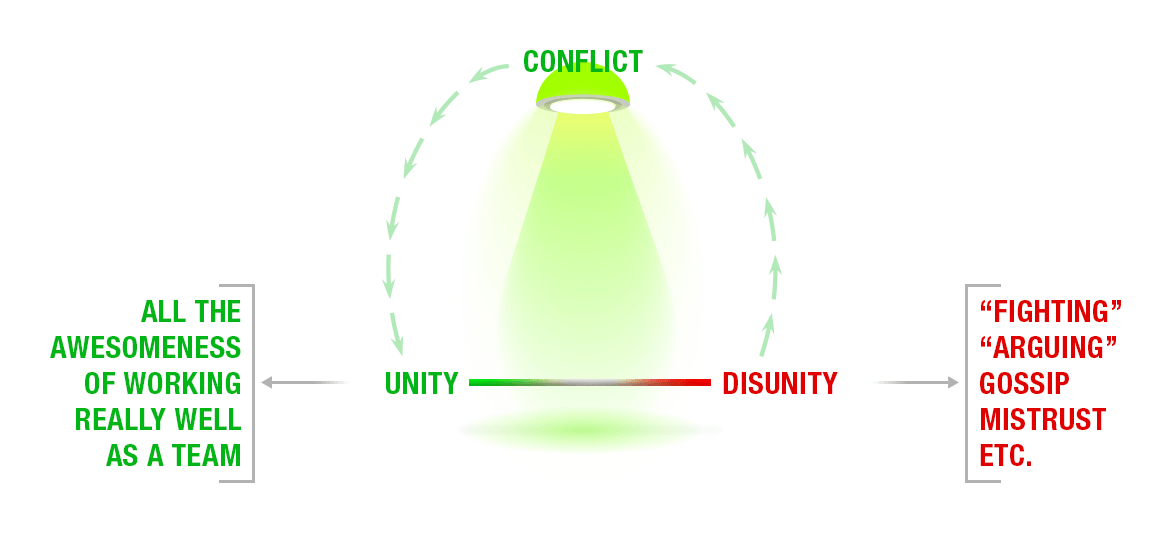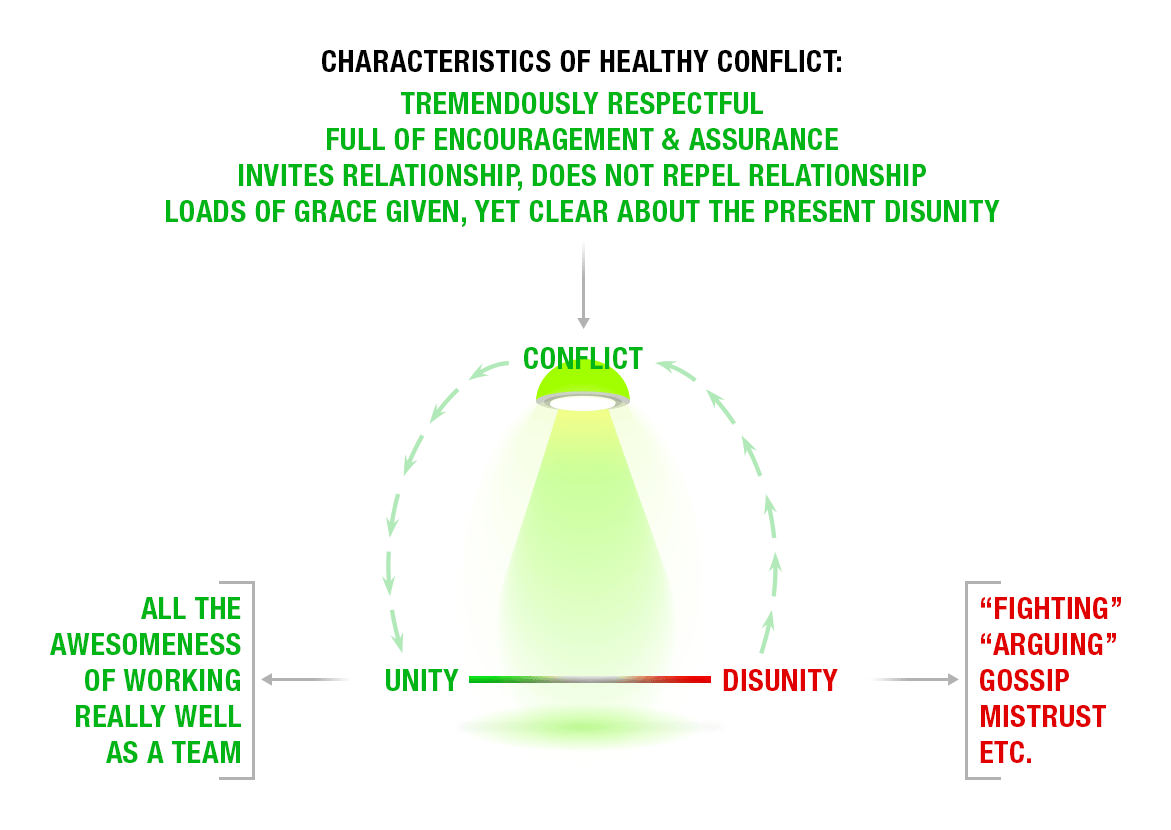In this article, I want to persuade you that conflict is awesome. To do this, we must don our shining armor, because in order to see the awesomeness of conflict, a rescue must take place. We must first rescue the word “conflict” from the clutches of the fierce and mighty beast, Tyrannical Thesaurus Rex.
The trouble is this: if you check any dictionary or thesaurus for “conflict” synonyms, you’ll find plenty of brutal words like “fight, argue, battle, clash, combat,” etc. If that’s what we think “conflict” is, then of course we are going to try our hardest to not engage in “conflict” at work! No one wants battle or combat at work.
But we need not think of conflict in this way! Let me suggest to you that a clearer, crisper definition of conflict brings it out of the darkly lit antagonistic clutches of “fight” and into the bright light and wide open field of glory that it is. Conflict is what you do to pursue unity when a relationship drifts towards disunity. This, fellow comrades, is glorious.
Do you see? Conflict as a verb is not the disunity-creator. Conflict is the unity-getter! It’s the unity-preserver! Conflict is what you can do when disunity has taken root and something must be done to get back on the same page, unified as a team. This singular understanding of conflict, though it may represent a paradigm shift for you, can be transformative. Bank on this: if you will embrace this paradigm shift about conflict and seek to become someone with strong conflict skills at work, the cumulative profit you will gain in your careers will be immeasurable!
So let’s flesh this out and work toward a fuller, more powerful conceptualization of conflict. To do this, we are going to consider two diagrams.
First, conflict is not “fighting.” This cannot be stressed enough! The things we likely think of when we think of “fighting” or “arguing” are undesirable things that flow from disunity. Conflict, on the other hand, is something wonderful. It is something you can do to change disunity in a relationship into unity. This is altogether desirable! As the unity rescuer, conflict is resoundingly awesome. Park on the diagram below for a moment and really let it sink in. The things you want to avoid at work are the fruit of disunity, whereas conflict, in all it’s glory, is in fact one of the very best ways to rescue a relationship from those hideous manifestations of disunity.

Second, conflict is communication that specifically brings disunity into light. Here is why this is important to understand: Notice that before, we said conflict is “something” you can do to change disunity to unity—not “the only thing” you can do. Obviously, there are many things you can do to help bring about this change, and conflict is but one of them. Easy examples are offering help, giving affirmation or encouragement, getting away from work and just shooting pool to hang out with the person you were so ill with earlier. Those things are not conflict, but they can certainly help move things back toward unity.
So what is special or essentially distinctive about conflict? In addition to being something you do to try to gain unity where there is disunity, it is communication that specifically casts light on the disunity.
If I’m getting frustrated with you because you keep double parking in the morning such that I can’t get a space nearby, then when we conflict about that, I’m probably going to need to let you know that it’s your double parking that’s causing tension in our relationship. We’re going to need to talk about the disunity that’s taking root. Unless of course I choose to resort to stealthy retributive prankery, but let’s not talk about that.

Now, a word to any readers who might consider themselves conflict avoiders. First, conflict is not the thing to avoid, because it is wonderful. Most likely, what you (properly) hate is the fruit of disunity: arguing, fighting, discord, etc. If you hate those things, as we all do, then this is, in fact, motive to love and desire conflict in the face of disunity, because conflict is the unity rescuer.
Second, you have so many strengths that contribute to you being a conflict avoider. In fact, I wrote our last article in this series just for you, because I wanted to equip myself to communicate this clearly. If you are a conflict avoider, you likely treasure smooth waters and really hate when the waters start to feel rough in a relationship. You likely love patience and love to season your words with kindness and grace. You love that “time heals.” All of these are extraordinary strengths.
But as I wrote about in the article on samurai, these massive, commendable strengths and skills can yet be tremendous vulnerabilities if a situation demands they be sheathed in favor of other strengths.
Treasuring smooth waters is a strength in so many ways, but it is a hindrance if what is needed is to bring into light the very reason for the persistently rough waters so that it can be addressed and smooth waters regained. You may love patience, but there can be a point where my patience with the car in front of me who hasn’t started moving after the red light turned green means that dozens of other people are hindered because I haven’t honked my horn.
You may love to season your words with kindness and grace, and for that reason dislike conflict. If this is true of you, then it may be that you have yet to realize that during conflict, that very kindness and grace you love to show may be more powerful and more essential in the very moment of conflict than in all the times they were offered in smooth waters. And you may love that “time heals,” but if healing can come quickly through intentional conflict communication, is it not worth the courageous attempt to rescue a relationship from prolonged disunity and develop these conflict skills?
So there you have it. Conflict is awesome and conflict avoiders need not avoid conflict, because the very strengths that may motivate them to avoid conflict should in fact motivate them to hate disunity and treasure conflict as a means to rescue a relationship from disunity. If we can master these ideas in the workplace, the floodgates would open wide for our satisfaction at work, lifelong income and job opportunities.
Now train like your careers depended on it!









